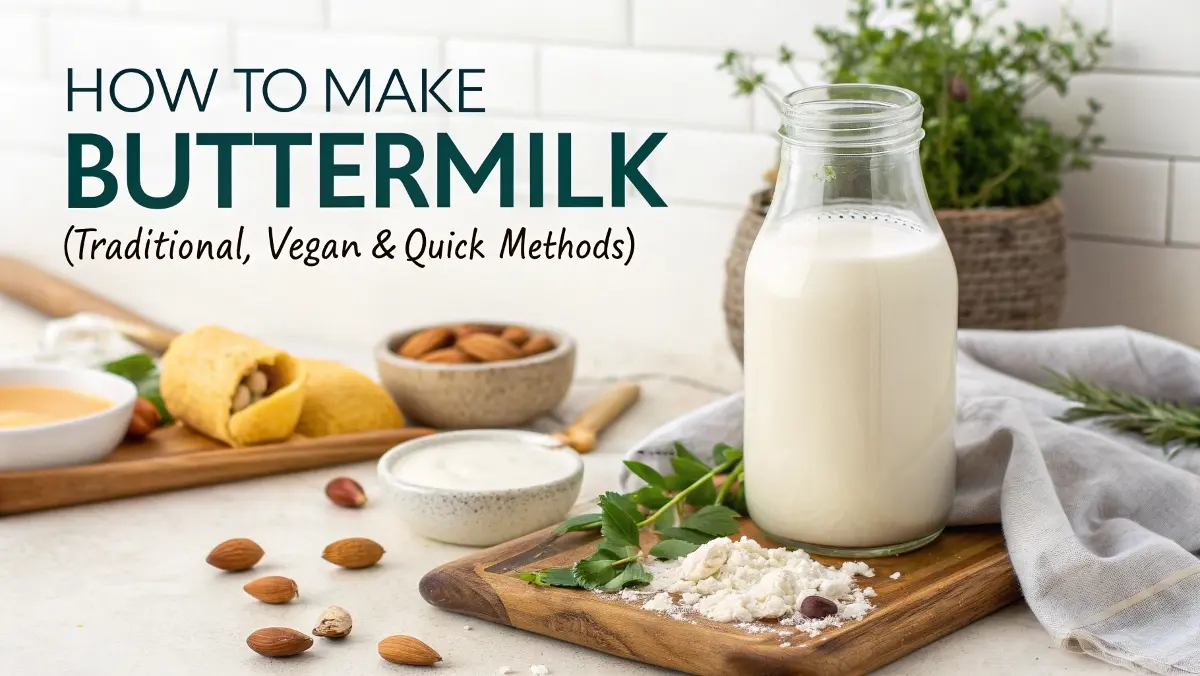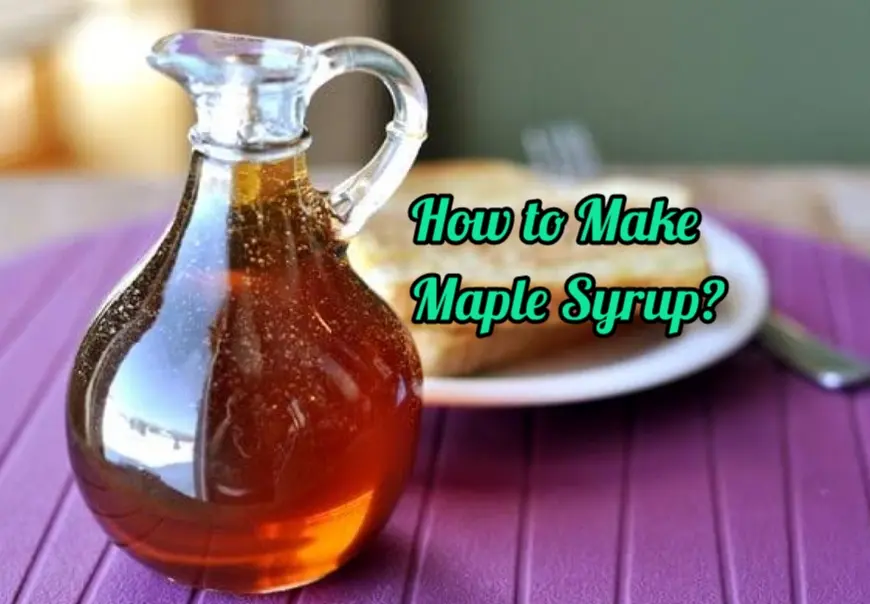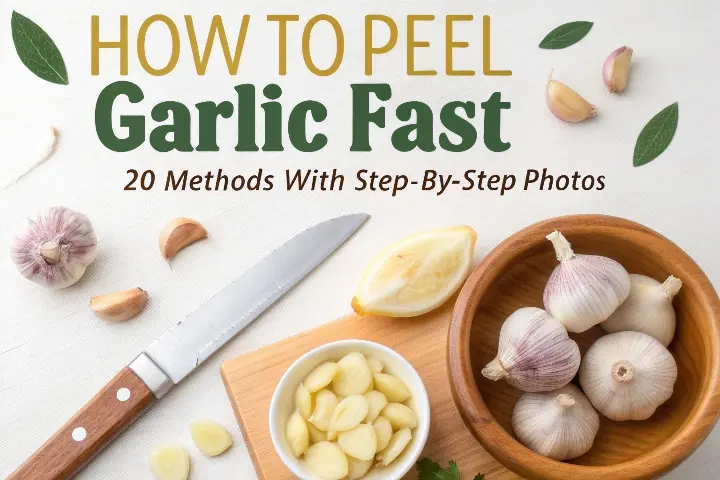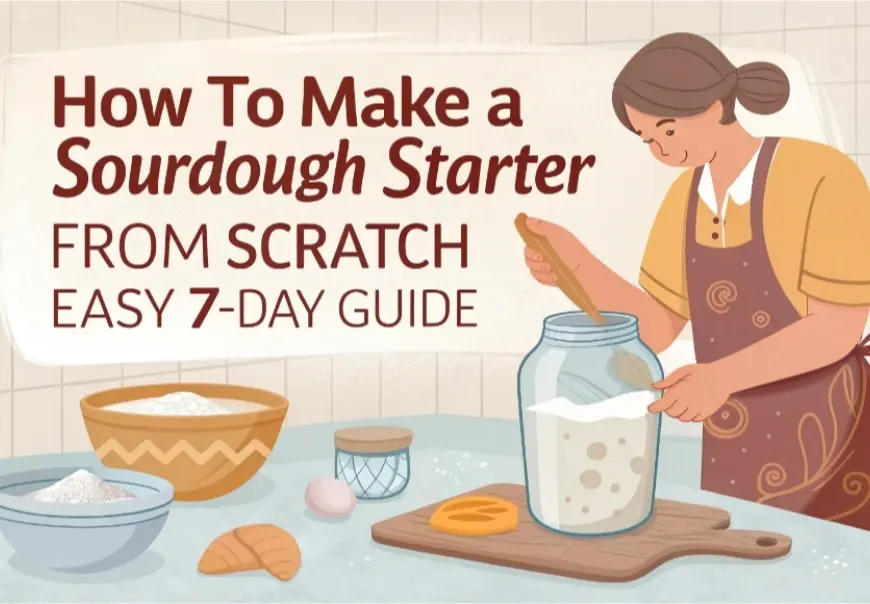Buttermilk is a kitchen superhero. It makes pancakes fluffy, fried chicken crispy, and cakes moist. But what if you’re halfway through a recipe and realize you’re out of buttermilk? No problem! I’ll show you 10 foolproof ways to make buttermilk at home using ingredients you probably already have.
This isn’t just a list of methods—I’ll explain why each technique works, which recipes they’re best for, and even how to make real cultured buttermilk like your grandma used to make. Plus, I’ve included storage tips, recipe ideas, and answers to all your buttermilk questions.
What Exactly Is Buttermilk?
Let’s clear up the confusion first. There are actually two types of buttermilk:
- Traditional Buttermilk – The liquid left after churning butter from cream. Thin, slightly tangy, and not very common today.
- Cultured Buttermilk – What you buy in stores. Made by adding bacteria to milk, which ferments and thickens it, giving that signature tang.
Most recipes need cultured buttermilk. The good news? You can mimic it easily at home.
Why Buttermilk Works in Recipes (The Science Bit)
Before we get to the methods, here’s why buttermilk is so special:
- Acidity reacts with baking soda, creating bubbles that make baked goods rise.
- Tenderizes meat in marinades (hello, perfect fried chicken!).
- Adds moisture without making batter too thin.
- Gives a tangy flavor to dressings, biscuits, and pancakes.
Now, let’s make some buttermilk!
Do you want to know How to Make Garlic Butter?
10 Ways to Make Buttermilk at Home
1. The Classic: Buttermilk with Vinegar (Best for Baking)
Why it works: Vinegar’s acidity curdles milk, mimicking real buttermilk.
What you need:
- 1 cup milk (whole or 2% works best)
- 1 tbsp white vinegar OR apple cider vinegar
How to do it:
- Pour vinegar into a measuring cup.
- Fill with milk to the 1-cup line.
- Wait 5-10 minutes until slightly thickened.
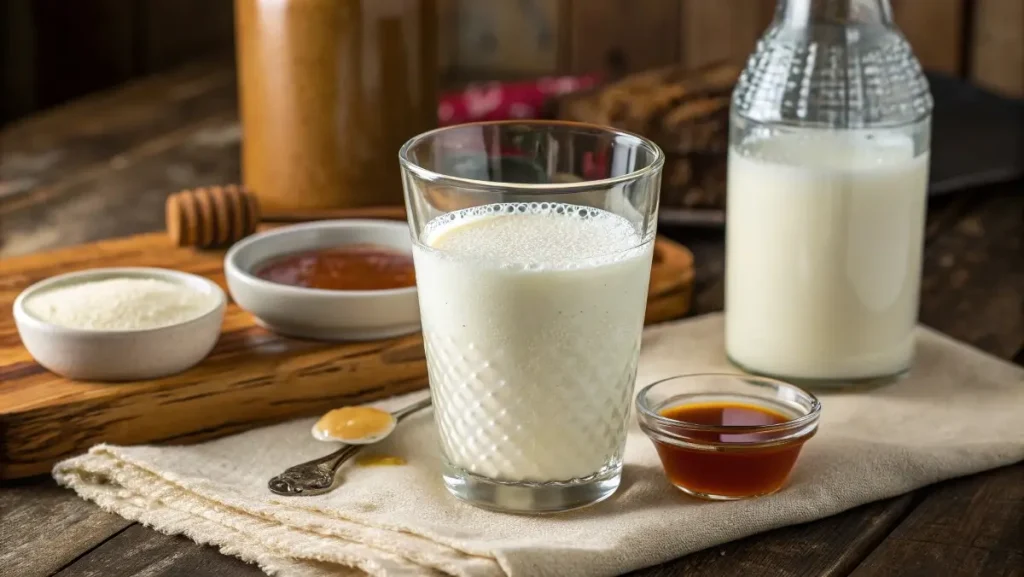
Best for: Cakes, muffins, pancakes (where texture matters).
2. Bright & Zesty: Buttermilk with Lemon Juice
Why it works: Lemon juice is another acid that curdles milk beautifully.
What you need:
- 1 cup milk
- 1 tbsp fresh lemon juice
How to do it:
Same as vinegar method—mix and wait!
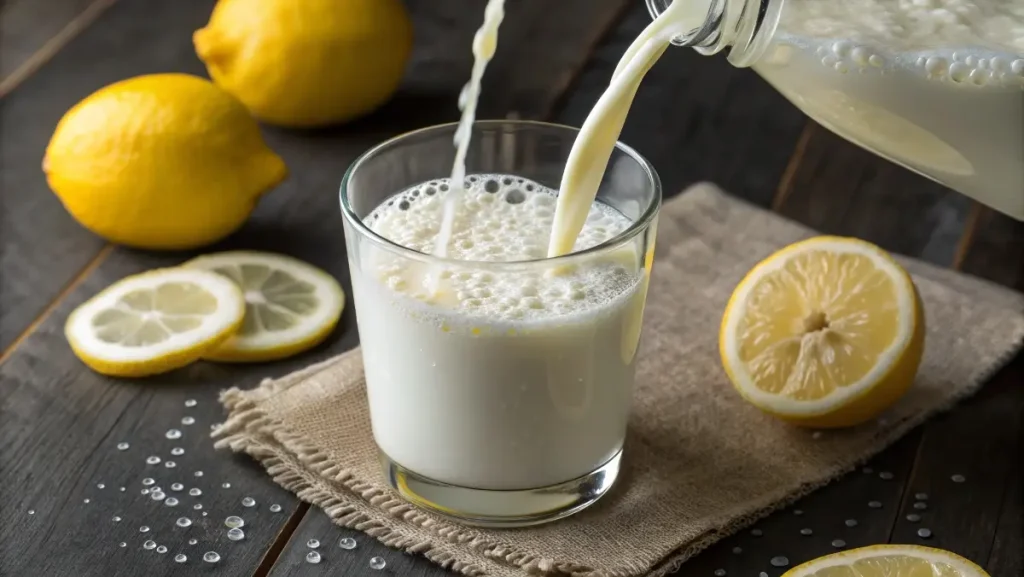
Best for: Salad dressings, marinades (adds a light citrus note).
3. The Baker’s Secret: Buttermilk with Cream of Tartar
Why it works: Cream of tartar is a dry acid, perfect when you don’t want added liquid.
What you need:
- 1 cup milk
- 1¾ tsp cream of tartar
How to do it:
- Mix cream of tartar with 2 tbsp milk to make a paste.
- Stir in remaining milk.
- Let sit 5 minutes.
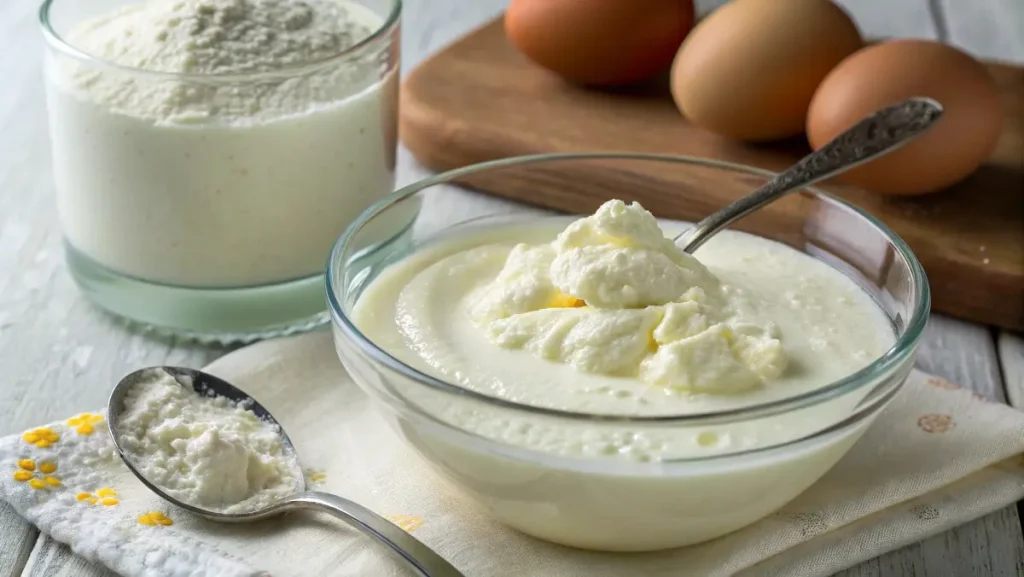
Best for: Delicate cakes (no lemon/vinegar flavor).
4. Creamy & Thick: Buttermilk from Yogurt
Why it works: Yogurt is already cultured, so thinning it mimics buttermilk.
What you need:
- ½ cup plain yogurt
- ½ cup water or milk
How to do it:
Whisk together until smooth.
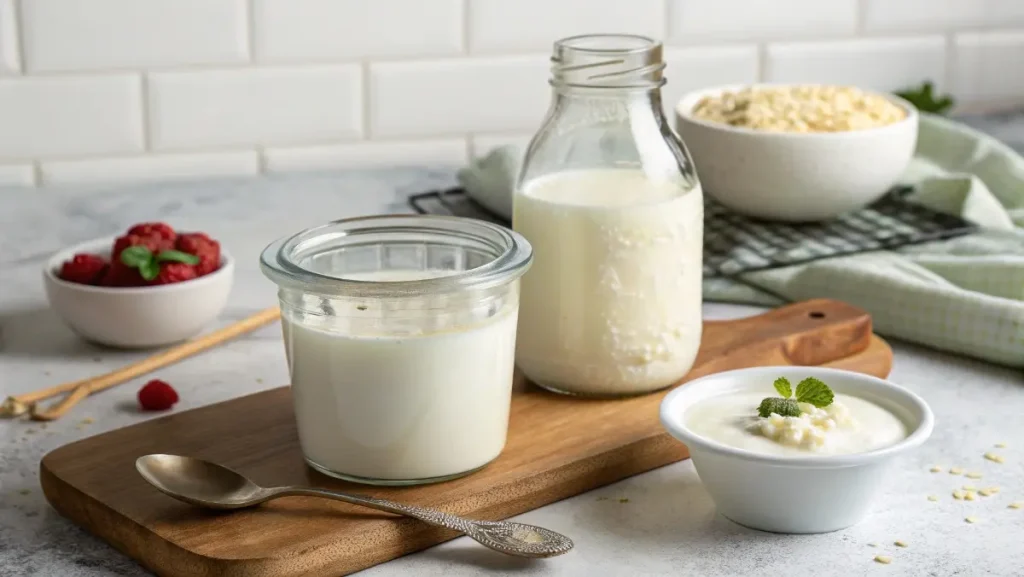
Best for: Smoothies, Indian recipes (like raita or lassi).
5. Dairy-Free Buttermilk (Vegan Option)
Why it works: Plant milks can curdle too!
What you need:
- 1 cup almond/soy/oat milk
- 1 tbsp vinegar or lemon juice
How to do it:
Same as dairy milk—acid + wait.
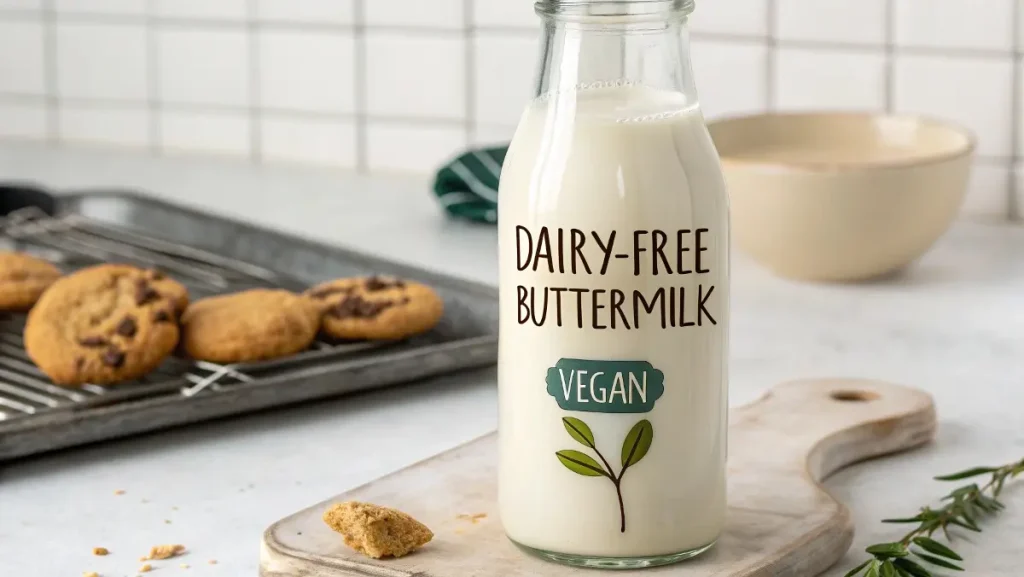
Best for: Vegan baking (note: coconut milk adds flavor).
6. The Real Deal: Cultured Buttermilk (Like Store-Bought)
Why it works: Uses live cultures for authentic flavor.
What you need:
- 4 cups milk
- ½ cup store-bought cultured buttermilk (as starter)
How to do it:
- Warm milk to 86°F (30°C).
- Mix in starter.
- Cover and let sit 12-24 hours until thick.
- Refrigerate.
Best for: Drinking, ranch dressing, or if you use buttermilk often.
7. Instant Buttermilk Powder (For Emergencies)
Why it works: Powder + water = instant buttermilk.
What you need:
- Buttermilk powder (like Saco)
- Water
How to do it:
Follow package instructions (usually ¼ cup powder + 1 cup water).
Best for: Camping, or keeping in pantry for last-minute needs.
8. Sour Cream Buttermilk (Extra Rich)
Why it works: Sour cream is already fermented.
What you need:
- ¾ cup sour cream
- ¼ cup water/milk
How to do it:
Thin sour cream with liquid.
Best for: Biscuits, scones (adds extra richness).
9. Kefir Buttermilk (Probiotic Boost)
Why it works: Kefir is fermented like buttermilk.
What you need:
- Plain kefir
How to do it:
Use as-is, or thin with milk if too thick.
Best for: Smoothies, or if you want gut-health benefits.
10. Buttermilk from Scratch (18th-Century Style)
Why it works: This is how great-grandma did it!
What you need:
- Heavy cream
- A jar
How to do it:
- Shake cream in a jar until it turns to butter.
- Strain—the leftover liquid is true buttermilk.
Best for: Historical cooking, or if you’re feeling adventurous.
Pro Tips for Perfect Buttermilk
- Whole milk works best (low-fat milk makes thinner buttermilk).
- Room-temperature milk curdles faster than cold.
- Shake before using—homemade buttermilk may separate.
- No buttermilk? In recipes, you can sometimes use:
- 1 cup milk + 1½ tsp cream of tartar (no waiting).
- 1 cup milk + 1¾ tsp baking powder (for emergencies).
How to Store Homemade Buttermilk
- Fridge: Up to 2 weeks in a sealed container.
- Freezer: Pour into ice cube trays for recipe-sized portions (thaw overnight).
- Signs it’s bad: Mold, strong sour smell, or separation that doesn’t mix back.
5 Delicious Ways to Use Buttermilk
- Fluffy Pancakes – The acid makes them rise extra high.
- Crispy Fried Chicken – Tenderizes and adds flavor.
- Red Velvet Cake – Gives that iconic tang and color.
- Ranch Dressing – The base for the best homemade ranch.
- Irish Soda Bread – No yeast needed—just buttermilk + baking soda!
Buttermilk Troubleshooting & Expert Tips
Even with simple methods, sometimes things don’t go as planned. Here’s how to fix common buttermilk problems:
Problem: My Buttermilk Isn’t Thick Enough
Solution:
- Use whole milk instead of low-fat.
- Add an extra ½ tsp of acid (vinegar/lemon).
- Let it sit longer (up to 15 minutes).
Problem: My Buttermilk Smells Weird
Solution:
- If it smells sour but not foul, it’s fine.
- If it smells rotten or cheesy, toss it—your milk may have been old.
Problem: My Baked Goods Didn’t Rise
Solution:
- Check expiration dates on baking soda (it loses potency over time).
- Make sure your buttermilk is acidic enough (add a bit more vinegar if needed).
Buttermilk vs. Alternatives (When You Can’t Use It)
Sometimes, you need a substitute for buttermilk itself! Here’s how to swap it:
1. Plain Milk + Acid
- Use the same vinegar/lemon method, but in reverse.
- Best for: Recipes where tang matters (like dressings).
2. Yogurt or Sour Cream
- Thin with milk to buttermilk consistency.
- Best for: Dips, marinades, or thick batters.
3. Powdered Buttermilk
- Mix with water per package instructions.
- Best for: Dry mixes or camping trips.
Buttermilk Around the World
Different cultures use buttermilk in unique ways:
- India: “Chaas” – Spiced buttermilk with cumin and mint.
- Ireland: “Soda Bread” – Uses buttermilk for rise and flavor.
- Southern U.S.: “Buttermilk Pie” – A creamy, tangy dessert.
- Turkey: “Ayran” – A salty yogurt drink similar to buttermilk.
Try these global recipes with your homemade buttermilk!
Buttermilk Health Benefits (More Than Just Cooking!)
Buttermilk isn’t just for recipes—it’s good for you too!
- Probiotics: Cultured buttermilk aids digestion.
- Low Fat: Fewer calories than whole milk.
- Calcium & Protein: Great for bones and muscles.
- Hydration: Electrolytes help with hydration.
Fun Fact: In many cultures, buttermilk is a traditional remedy for hangovers!
Buttermilk Hacks You Didn’t Know
- Tenderize Meat: Soak chicken or pork in buttermilk before frying.
- Fluffier Scrambled Eggs: Add a splash to eggs before cooking.
- Creamy Mashed Potatoes: Substitute some milk with buttermilk.
- DIY Face Mask: Mix with honey for glowing skin (yes, really!).
FAQs – Your Buttermilk Questions, Answered
1. Can I use buttermilk instead of milk in recipes?
Yes, but reduce baking soda (since buttermilk is acidic). For 1 tsp soda, use ½ tsp with buttermilk.
2. What’s the best milk for homemade buttermilk?
Whole milk gives the thickest results, but 2% works too. Avoid skim—it’s too thin.
3. Why didn’t my buttermilk thicken?
Homemade versions won’t get as thick as store-bought. If it’s runny, add a bit more acid or use less liquid with yogurt/sour cream.
4. Can I drink homemade buttermilk?
Absolutely! Add honey or salt for a refreshing drink (popular in India and the Middle East).
5. Does buttermilk go bad?
Yes—if it smells rotten or has mold, toss it. Properly stored, it lasts 2 weeks.
6. Can I make buttermilk with lactose-free milk?
Yes! Use lactose-free milk + acid (vinegar/lemon).
7. Why does buttermilk make fried chicken better?
The acidity breaks down proteins, making meat juicier, while sugars help crust brown.
Final Thoughts
Now you’re a buttermilk expert! Whether you need a quick substitute with vinegar or want to culture your own, you’ll never be stuck without buttermilk again.
Try these methods and let me know which one works best for you! Got another buttermilk hack? Share it in the comments—I’d love to hear your tips.
Happy cooking! 🥛🍰
